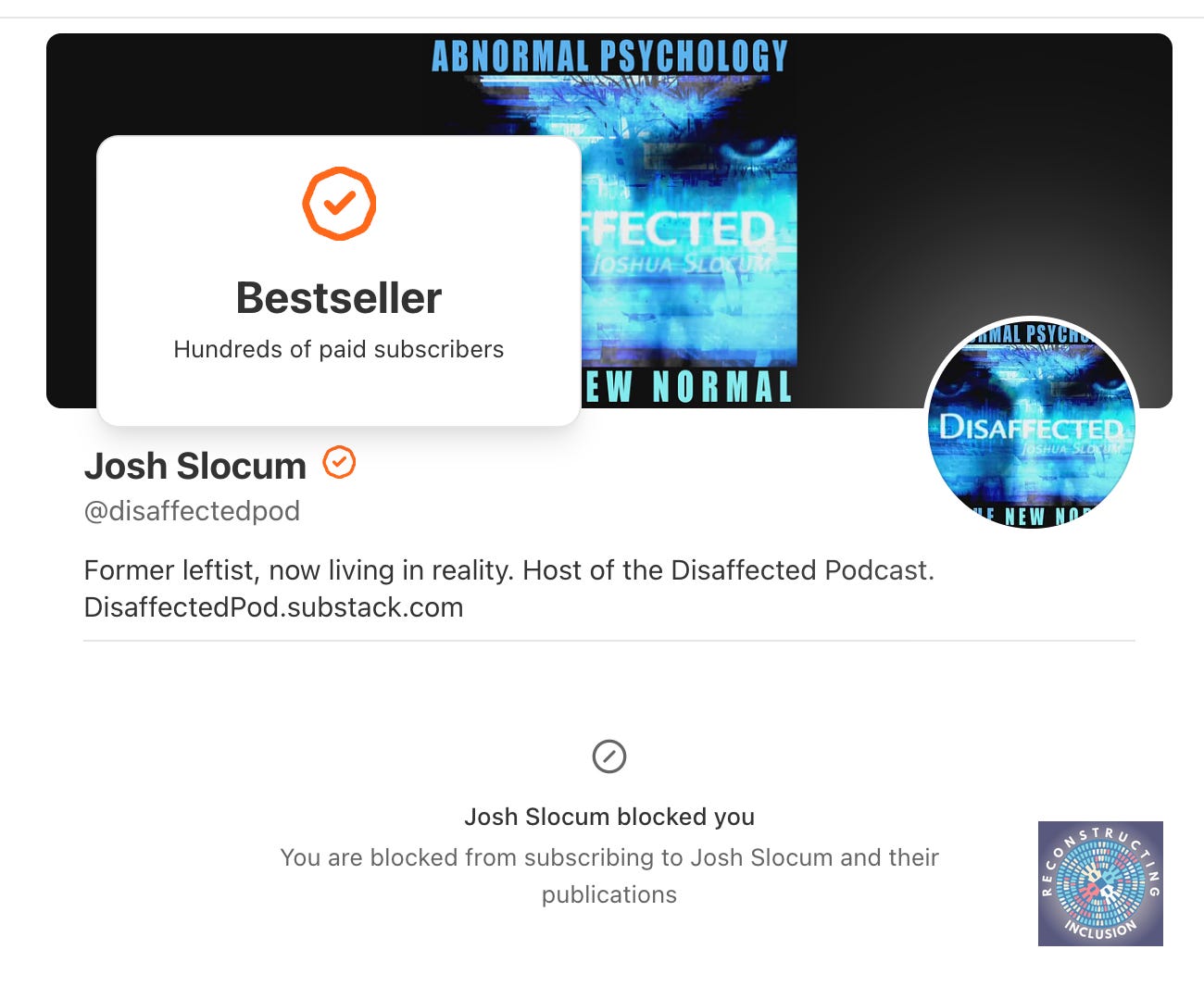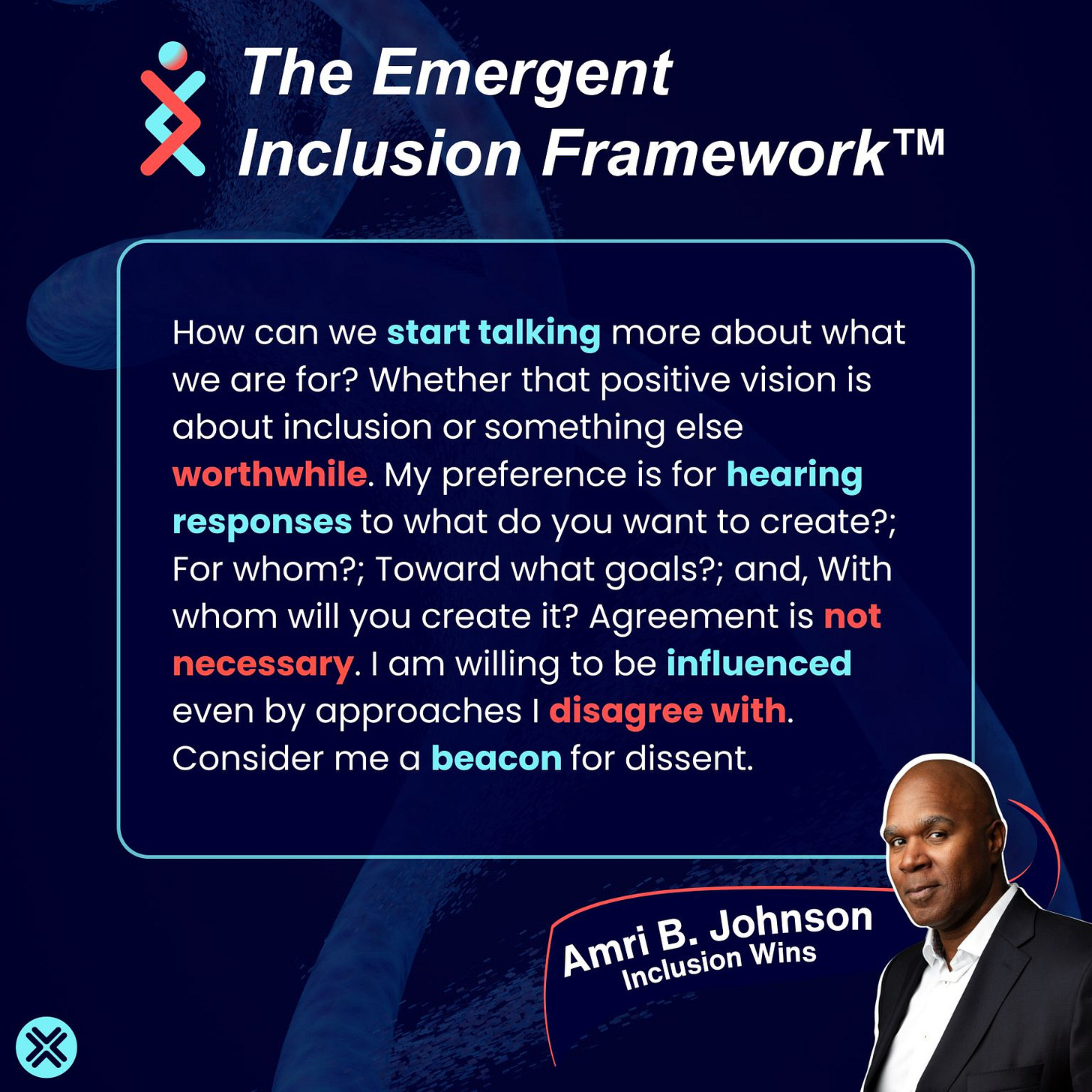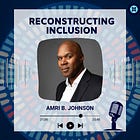The Problem is [ ]...and Writers Who Can't Handle Dialogue
My response to Josh Slocum: considerate, civil, and relatively conservative, at least for what many would expect from someone who works in the so-called DEI space.

I am writing this on 14 August 2025, on what would have been my father's 85th birthday. He transitioned less than a month after reaching his 77th trip around the sun.
Invoking my dad's presence is not something I need to do outwardly. His countenance, fierceness, and compassion pierce through my veins. I can only hope that I am ever half the man, the father, the human being that he was.
I am calling him up now, because it is his born day and because I got blocked by relatively popular writer, Josh Slocum (at least to me as he has over 4000 subscribers and one of those neat orange check in an orange octagon badges as a "Bestseller"), on this platform for further contextualizing his argument in an article that he published entitled, "The problem is black people. . .and whites who won't say it."
These things, my dad’s birthday and being blocked, don't seem related. And, as my Old Dude (what I called him), who considered himself a "black" man, who was born toward the end Jim Crow segregation laws, and was amongst the student body to integrate public schools in Topeka, KS where we grew up, he would no doubt be interested in why Josh chose to block me.
Slocum's thesis was, "The problem today is black people. Black people's behavior is uncivilized."
After reading it, I was hesitant to respond, but after a couple of days and a belief that Josh, given his being close to my age, and someone who, while holding viewpoints that occur to me as reactive and born out of pain and trauma, and different from my own, seemed honest. It appeared that he is a person who says what he means and means what he says.
Perhaps this belief is why I had mixed feelings as a result of my excommunication from his Substack world. A world that I seemed to inhabit for about 24-48 hours.
My feelings about the digital obstruction are a combination of gall, surprise, and delight.
Gall, because I figured that a fellow Gen X'er would be up for a bit of good faith back and forth. Not be automatically on the defensive, uncurious, and full of a weird mix of ad hominem assumptions and strawman responses.
The responses have been deleted, but they started with an assumption about my intentions, moved to criticizing my clarification my intentions—to reinforce that he was "right about me all along"; to, "You are just trying to weaken my argument!. . .You weren't acting in good faith all along, and I knew it!!! I am done with you!" I am paraphrasing from memory.
@Josh, if you ever decide to make the comments public again, you can confirm or deny what I have tried to recall accurately.
If Josh had dug deeper, even though he was forced from the industry due to his political beliefs (which I think is wrong), we even share the reality of intimately knowing the funeral business, as my father was a mortician/funeral director, and my mother still runs the family business.
Given where he seems to purport that he sits on the political spectrum, his responses seem more like "lefties.” You know, “those people” supposedly always trudging through a logical fallacy sludge. .. oh my!
A deeper look on perpetuating victimhood
My surprise came because what I said in the comments was something my dad, Larry D. Johnson, Sr., would have been proud of.
I agreed with Josh on some of his points. What he was describing, although without eloquence and depth, was the plight of an archetype Thomas Sowell would describe as "Black Rednecks”, from his book, Black Rednecks and White Liberals.
Black Rednecks are so-called blacks from the American South whose behavior is an artifact of what originated from “Redneck” culture in parts of Britain and Scotland, planted itself in the Southern U.S. states, and has profoundly shaped both “white” and “black” communities. Some would call it (when referring to “black” people) "ghetto" or "hood" culture.
Josh, in his brash, branded, and bombastic way, also talks about white liberals. In the article, he talks about what Sowell would agree is black redneck culture and how some “white” people say and do nothing don’t “recognize the reality that we are in a race war,” and that “Black people collectively, generally. . .have made it clear they fucking hate white people.” It is unclear who the “we” is in this case, given that he condemns “whites” who disagree with him and says “not all [“blacks”].
While he started the piece not attributing the behavior of Black Rednecks to all people who one would consider racialized as black, as he moved towards his conclusion, he had reduced Black Rednecks to "the problem today is black people. . .and whites who won't say it."
What occurred as his pain, anger, or vitriol based on his experiences (personal and observed) with some black people, moved him from a level of distinction to a full-fledged reduction of a group identity. To him, Black Rednecks morphed into a general "black" culture.
So, why was I delighted to be blocked by Josh? My delight was that it was the first time it happened. That meant I could write about it!
I was once piled on by what was previously known as “Black Twitter” for a comment about a “white” historian who is one of the foremost experts on Harriett Tubman, but I have never been blocked before on a platform (that I was aware of).
And, even though I have had comments ignored, and been unfollowed by a few people, mainly on LinkedIn by people who work in diversity and inclusion, never before has someone with the cache amongst an audience that Josh has, ever felt compelled to intentionally whisk me away from their universe.
I rarely ease into threads (which I mistyped as "threat" in my first comment to his post; perhaps a more appropriate word given his reaction). It was only today that I realized I couldn't edit it, having gone to his publication and discovered my fate in the Slocum universe.
When I read posts, in this case Substacks with incendiary language and someone who has a base of people that widely agree with them or rarely challenge them in a way that is incisive and civil, I find little point to engage. My dad often shared a quote attributed to Benjamin Franklin, "A man convinced against his will is of the same opinion, still." So I don't wade into murky comment waters even when there is no evident, well-established base.
And after the death of George Floyd, I slowly withdrew from commenting on people who became popular through anti-racism-related posts, because if I strayed from the predominant narrative, the room for debate on the principles and merits of my argument only served as a spark for a fire that would get gasoline throw on it by those deeply invested in Kendi and DiAngelo-like narratives. I didn’t have the time to go down that rabbit hole without wonder.
While there were comments that asserted Josh's content was extreme, many agreed or considered his message resonant enough to restack it.
I don't know if few or many people racialized as black commented or not at the time. I chose to in good faith because I could see his point of view, as I have experienced poor/broke, broken, and ignorant kids racialized as black (Black Rednecks) exhibit abhorrent behavior reinforced by an internet-induced culture of banality that regularly goes viral.
While most of what I have seen is online, there have been a few situations where I have had to go into "OG Mode" while living in the USA and channel my most intense Uncle Ice Cube energy, in my dad's James Earl Jones-like (aka the voice of Darth Vader) voice, and say in so many words to young people disturbing the peace, "Check yourself before you wreck yourself!"
My response to Josh was considerate, civil, and relatively conservative, at least for what many would expect from someone who works in the so-called DEI space. My disappointment (while trying not to sound condescending) was that I was working to create an opening for a dialogue. That is not a world Josh chooses to be a part of.
Perhaps Josh took my opinion and questioning of his conclusions as a character threat. It didn't matter that I shared that I didn't see him as racist, an "asshole" (which one reader that I had an exchange with about race abolitionism asked if I thought he was), a "transphobe" (which I imagine he's been accused of and I only learned in preparation to write this article), none of the above did I state or insinuate.
In fact, I affirmed that I didn't see any of these things in Josh. Still, Josh reacted in an intellectually lazy way that I have seen many people online react when their brand is challenged—find flaws and make the "other" seem like an interlocutor with bad intentions. One of "them". An idea that I have worked hard to transcend, even when it is clear that the so-called other has ill intentions.
What I am left with is this article and a few questions:
Why did Josh block me? (It is all speculation for me at this point.)
What benefit did blocking me have for him, or what benefit to me did he want to prevent?
After reading my first response (because the other comments are no longer available), what might have created this exchange going in the direction that it did?
What else am I missing?
Here is my first comment again, excuse the "threat" and typos—at least you know it wasn't AI-generated if that means anything to you 😉.
Make it a great day! ✌🏾
Ready to transform inclusion from concept to action to being a cultural superpower?
When inclusion becomes "the way we do things around here," it transforms from initiative to being a key part of organizational identity.
Want to be part of this transformation? Join us for our upcoming free virtual event exploring the Emergent Inclusion Framework. Whether you're a skeptic or champion, your voice matters in this conversation.
I hope this was helpful. . . Make it a great day! ✌🏿








I commend you for seeking open-minded discussions, but you might be more selective in choosing them.
Your exchange with Josh only reinforces what behavioral science shows: people like him don’t change when challenged, they just dig in.
I read his post. He seems to have had some bad experiences with a few black people, internalized the emotion, and acts it out by confirming his worldview in a substack. His views strike me as extreme and ill-informed. Social media has provided a small number of people (.001% of the US population) to validate his feelings. Good for him.
Why waste your time on someone like that?
Think of it this way: the day you’re born, you're given an account in the Bank of Life with a finite amount of time. Every day, 24 hours are withdrawn without your consent. No deposits are allowed.
All you control is how you invest the time withdrawn. Each investment has an opportunity cost - once spent, that time is gone forever and can't be invested in anything else. Is Josh a good investment?
By all means, engage in open-minded conversations - I wish more people would - but you might consider your investment goals, options, and desired returns in selecting those engagements.